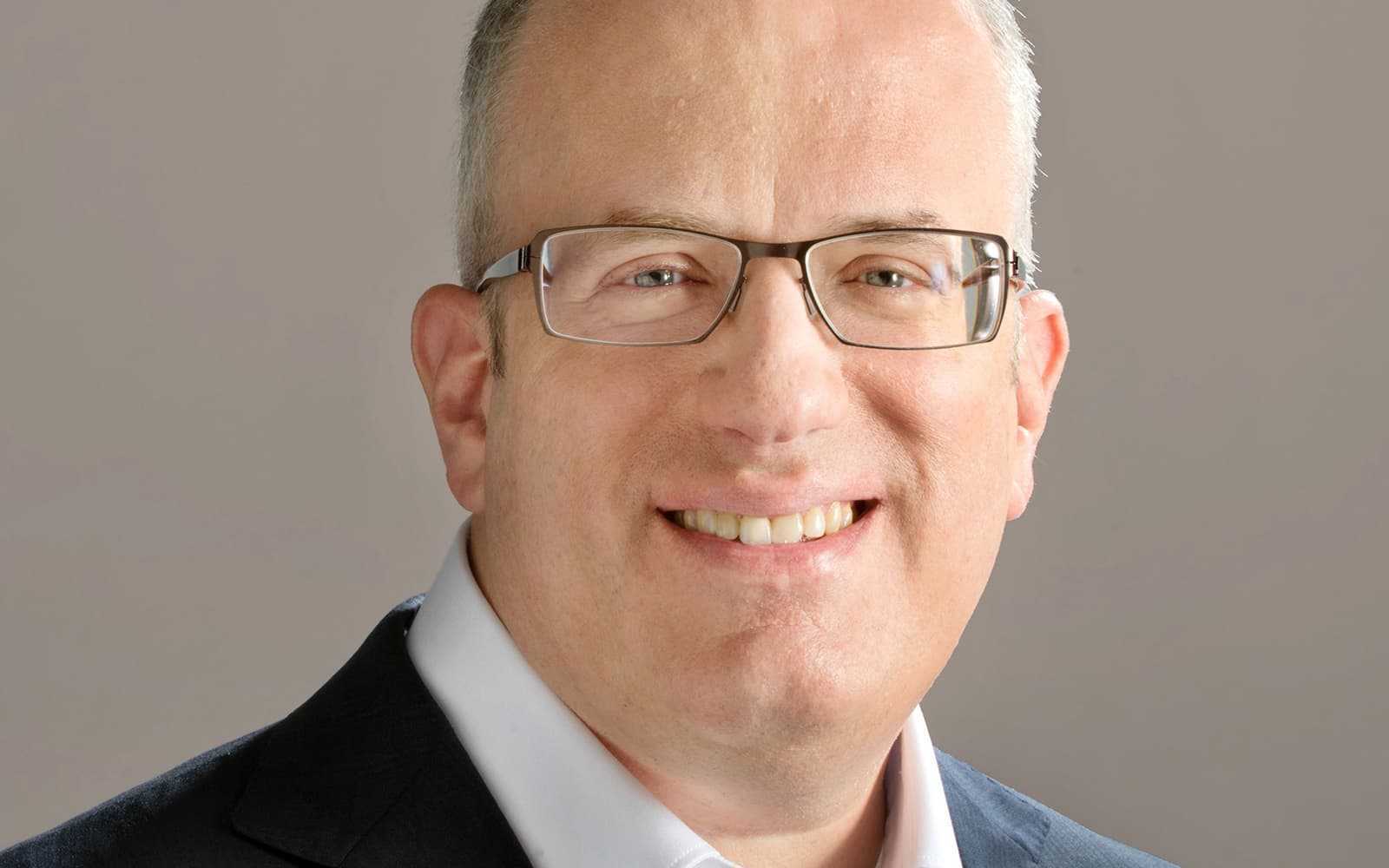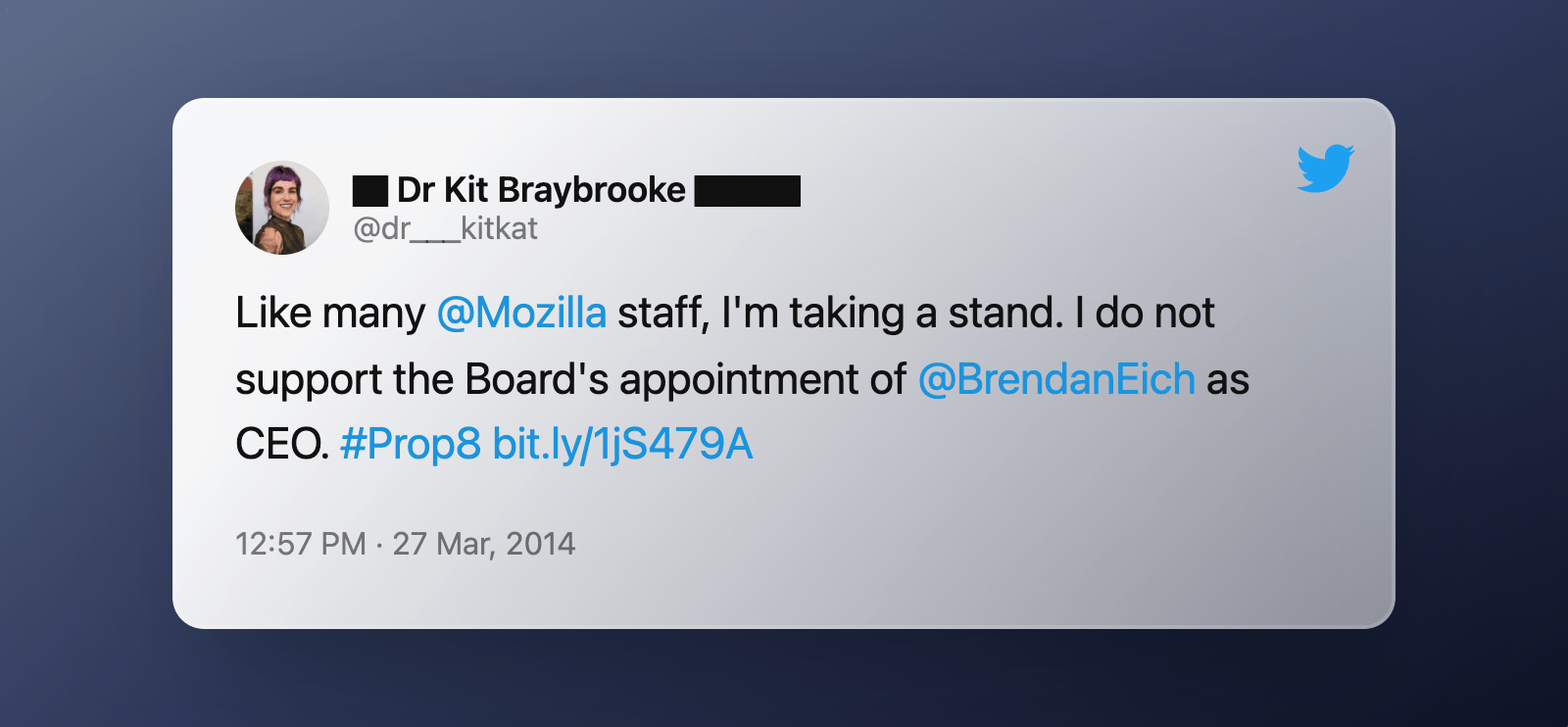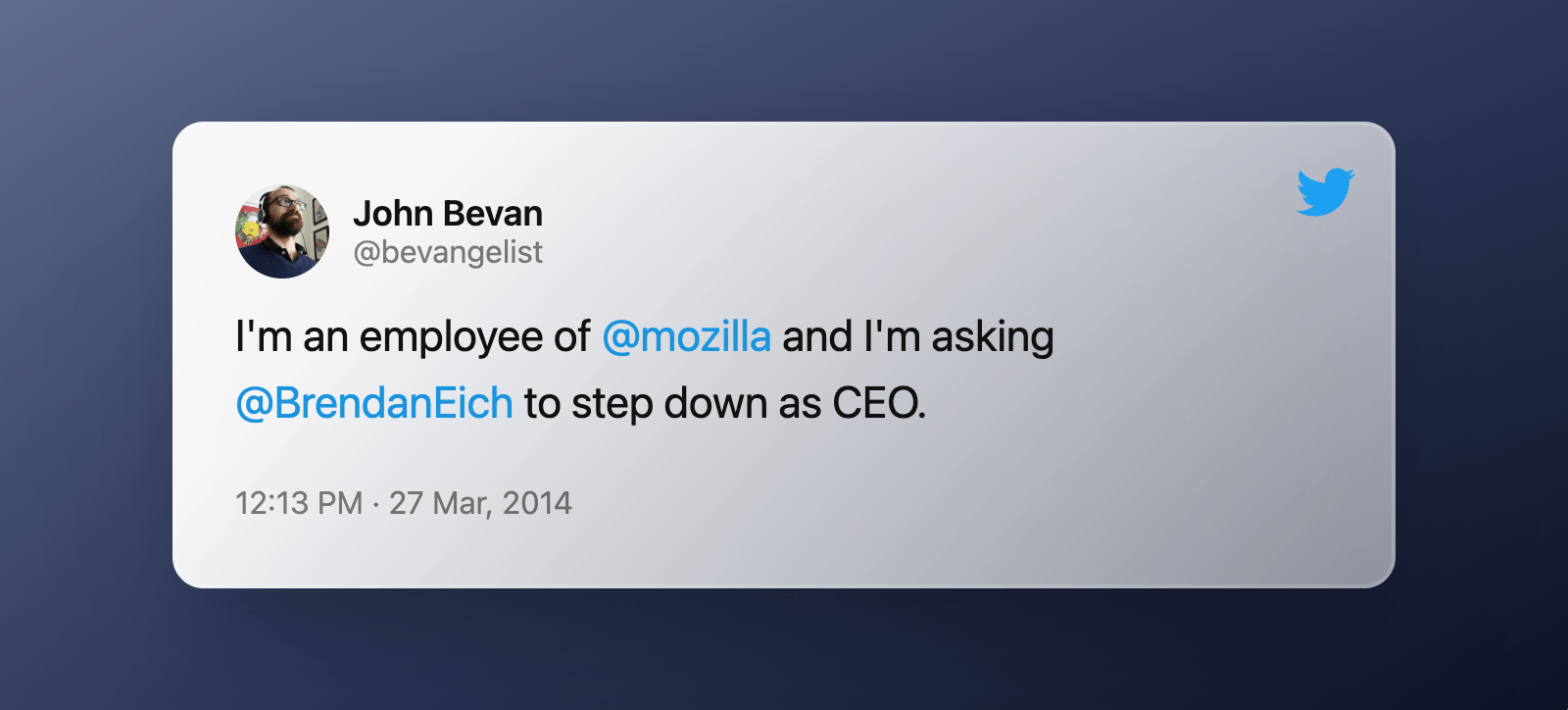The Disappearance of Mozilla’s CEO: A Reminder of the Need for Tough, Expensive Grace

Brendan Eich may have set the world record for shortest tenure as a CEO. On March 24, 2014, Eich was elected CEO of Mozilla, the organization behind the Firefox web browser. Prior to that, he was Mozilla’s CTO, helped found the non-profit Mozilla Foundation, and created the JavaScript programming language, one of the cornerstone technologies of the Web. Based on these credentials, Eich seemed like a pretty obvious choice for CEO. However, his appointment was fraught with controversy, and on April 3, 2014 — 11 days after his promotion — he announced that he was stepping down as CEO and leaving Mozilla altogether.


Online dating service OkCupid temporarily posted a message on their homepage for Firefox users that read, in part, “Mozilla’s new CEO, Brendan Eich, is an opponent of equal rights for gay couples. We would therefore prefer that our users not use Mozilla software to access OkCupid.” An especially aggressive reaction appeared on CredoAction, where gay marriage advocates launched a petition (now discontinuted) calling for Eich to step down (or Mozilla’s board to fire him) if he didn’t make “an unequivocal statement of support for marriage equality.”
For his part, Eich wrote a lengthy response to his critics. He didn’t explicitly address the 2008 donation but did express “sorrow at having caused pain” and reaffirmed his commitment to “ensuring that Mozilla is, and will remain, a place that includes and supports everyone, regardless of sexual orientation, gender identity, age, race, ethnicity, economic status, or religion.” Eich reaffirmed this stance in a recent interview:
I’ve always treated people as they come, I’ve worked with them, tried to get them into the project, I’ve been as fair and inclusive as anyone — I think more. I intend to be even more so as CEO because I agree there’s an obligation to reach out to people who for whatever reason are marginalized.
Not everyone at Mozilla was critical of Eich. Mozilla Foundation chair Mitchell Baker — one of the primary proponents of Mozilla’s inclusive policy — voiced her support of Eich:
My experience is that Brendan is as committed to opportunity and diversity inside Mozilla as anyone, and more so than many. This commitment to opportunity for all within Mozilla has been a key foundation of our work for many years. I see it in action regularly.
Christie Koehler, a queer developer at Mozilla, wrote that, while personally disappointed by Eich’s donation, she had never experienced any hardship because of it, nor did she see Eich standing in the way of Mozilla’s inclusive policies. Others, like Geoffrey MacDougall (Mozilla’s Head of Development), voiced the conflict they felt between respecting Eich’s right to free speech while still supporting Mozilla’s inclusive culture.
Obviously, given Eich’s departure, such support wasn’t enough to end the growing dischord within and without Mozilla. By all accounts, Eich left on his own accord, but it’s pretty obvious that the outcry over his personal views forced his — and Mozilla’s — hand. (As Mozilla developer Gervase Markham put it, “[Eich] wasn’t forced out from the inside — he was dragged out from the outside.”)
Needless to say, some on the conservative end of the ideological spectrum have been nigh-apoplectic over Eich’s departure, seeing it as clear evidence of intolerance by gay rights supporters. Rod Dreher summoned the spectre of McCarthyism when describing Eich’s critics, and wrote that “the kind of people who ousted Brendan Eich want to live in a world in which expressing the ‘wrong’ opinion about same-sex marriage makes one unemployable, even if that opinion has nothing to do with their ability to execute their professional responsibilities.”
Ed Morrissey argued that “What makes a bad CEO can and has filled books, but his private political donations fall very far down any list — except for the so-called ‘tolerance’ and ‘no-H8’ squads that demand total subjugation to their agenda as the price to pay for public engagement on any level.” And the National Organization for Marriage recently announced a boycott of Mozilla and the Firefox browser, claiming that Eich’s critics were supporting “a ‘McCarthyesque witch hunt’ that reflects the desire of gay rights activists to punish anyone in society who fails to support their agenda of redefining marriage.”
Interestingly enough, though, some of the strongest criticisms of Eich’s critics have come from ardent supporters of gay marriage. Andrew Sullivan, a gay journalist who has been instrumental in promoting gay marriage, lashed out at those calling for Eich’s dismissal:
The whole episode disgusts me — as it should disgust anyone interested in a tolerant and diverse society. If this is the gay rights movement today — hounding our opponents with a fanaticism more like the religious right than anyone else — then count me out.
William Saletan wrote a satirical piece urging gay rights supporters to hunt down the other 35,000 people who donated in support of Proposition 8 and get them fired, too. Finally, Conor Friedersdorf criticized Mozilla’s hypocrisy concerning openness and tolerance, and the dangerous precedent that it sets:
Mozilla’s actions will undercut tough conversations by making fewer people willing to engage in them. If you believe that an open, robust public discourse makes the world better, as they purport to, they’ve made the world worse. This action is a betrayal of their values, not a reflection of them.
What can we learn from this sad, unfortunate incident? For starters, we should remember what LZ Granderson writes: “Eich’s case is about the power of information, and how — with technology, 24-hour news and social media — everyone’s past is just a hashtag away from being the present.” As the aforelinked Saletan piece points out, you can download a list of everyone who supported or opposed Proposition 8, a list that includes names, employers, and cities of residence. (For the record, 11 of my fellow Nebraskans supported Proposition 8 and 40 opposed it.) How can we be responsible with that sort of information — information that, as we saw with Eich, can quite literally ruin an otherwise exemplary employee’s career?
Second, the Eich controversy reveals, quite starkly, the deeply divided and conflicting understandings of such concepts as “tolerance,” “inclusiveness,” “equality,” and “freedom of speech.” And I fear that such understandings will only grow more divided and conflicted. Attitudes concerning gay marriage may be shifting considerably to its favor, but the issue and its related debate are far from resolved.
Which brings me to my final point: the Eich controversy is a firm reminder of the necessity for tough, expensive grace in our lives, relationships, and conversations, especially when it comes to such heated issues as gay marriage and LGBT rights. (I realize that’s a very Christian-y thing to say — when in doubt, add more grace — but that doesn’t make it any less true.)
One thing that struck me about Eich’s critics was that many held a pretty black-and-white view of him: If he wasn’t completely for them, then he was totally against them, regardless of what he said or promised, or what he had done (or hadn’t done) up to that point. They couldn’t seem to believe that somebody could hold such views and yet still be good manager, co-worker, or advocate for Mozilla. Rather, his views must be driven by hate, ignorance, and bigotry, and therefore represented a threat to what Mozilla stood for. Returning to Friedersdorf’s piece, he writes:
I’ve had many occasions to observe that an individual’s position on [gay marriage] turns out to be a flawed proxy for his or her attitude toward gays and lesbians. Gay-marriage supporters may have been more likely to be tolerant of gays. But I encountered people who’d say things like, “Look, I don’t want gays looking at me in the shower at the gym, but why should I care if they want to marry each other?” And I also encountered gay-marriage opponents who were, apart from opposing marriage equality, model parents to gay sons or daughters, exceptionally supportive to gay friends, and wonderful bosses to gay subordinates. This will seem perfectly rational to some readers and weirdly inconsistent to others. (For the latter, note that people are often weirdly inconsistent.)
I am in no way implying that gay marriage opponents haven’t been cruel, demeaning, judgmental, and guilty of a host of other evils. I can understand why gay marriage supporters, and those in LGBT communities, might respond harshly to gay marriage opponents given the awful attitudes and treatments that have emerged from that camp. That being said, we need to remind ourselves that those on the other side of whatever “culture war” we’re fighting are rarely the evil, malevolent masterminds that we can make them out to be.
It is a cold approach to take that one thing — that one aspect of their character, belief system (or lack thereof), or lifestyle that offends or troubles you — and make that the totality of how you view them. That is the opposite of grace, compassion, mercy, and understanding. People are far more complex and nuanced — and more inconsistent and unfathomable — than that.
This entry was originally published on Christ and Pop Culture on .